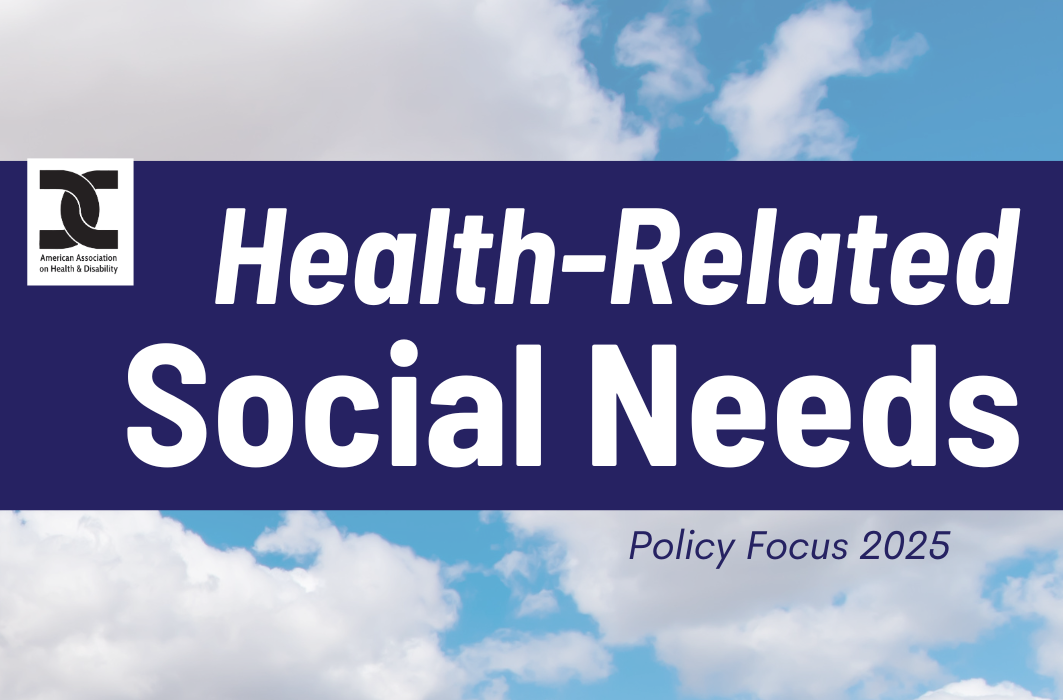Social drivers are critical in shaping health outcomes, maybe having a greater impact than medical care alone. Medicaid has been a leading source of funding for addressing social drivers of health. With deep cuts to Medicaid proposed by the recently passed reconciliation bill, we can assume that essential and already underfunded health programs are at risk. In this policy priorities blog, we share more about the urgent need for addressing health-related social needs, and funding essential programs that support them.
Addressing Health-Related Social Needs
Years of research have illuminated the urgency of addressing social drivers of health and health-related social needs to advance health equity. Social and environmental conditions – are incredibly important factors affecting the health of people with disabilities. Social drivers of health include the environmental and community-level experiences that shape a person’s health outcomes. Access to safe housing, good food, quality health care, and reliable transportation are common social drivers, while health-related social needs look more at individual factors, like whether a person is financially secure. Bringing funding for social factors into our health systems has required public funding streams, in particular through the Medicaid program.
Since 2023, a pilot project from the Center for Health Care Strategies (CHCS) has been underway to determine the effectiveness of Medicaid initiatives targeting health-related social needs (HRSNs). This Learning Series was piloted in nine state Medicaid agencies. Despite the expansion of Medicaid-funded HRSN initiatives since 2016, recent developments threaten to halt needed progress on social policies that affect health. The Partnership to Align Social Care has conducted similar pilots to address HRSNs under Medicare, which can now be billed for Community Health Integration (CHI), Principal Illness Navigation (PIN), and Principal Illness Navigation-Peer Support (PIN-PS) Services.
In 2023, the Centers for Medicare & Medicaid Services (CMS) released an informational bulletin to help make CHIP and Medicaid coverage available to cover services related to certain health-related social needs. Further guidance was offered in December 2024, expanding Medicaid programs for HCBS waivers and 1115 demonstration waivers. As of March 2025, this guidance has been rescinded by CMS, and looming Medicaid cuts threaten the progress of these programs. For now, previous guidance related to social drivers of health has not yet been formally rescinded. Medicare also updated their Physician Fee Schedule in 2023 to include payment policies related to HRSNs.
Home and Community-Based Service (HCBS) waivers are critical supports for ensuring people with disabilities can live independently in their communities. Additional supports like the 1115 demonstration waivers and Managed Care in lieu of services and settings (ILOS) programs further offer housing and nutrition services for recipients. These services have expanded how we can support the achievement of good housing, nutrition, and safe environments to support health.
Under these Medicaid programs targeting health-related social needs, beneficiaries with disabilities can access things like:
- Funding for caregivers to receive respite services. This allows caregivers to take a break from their caregiving responsibilities, while allowing for continuity of care.
- Day habilitation programs for people with intellectual and developmental disabilities who need support accessing community and independent living skills.
- Home accessibility modifications, for things like wheelchair access ramps, grab bars, and handrails.
- Environmental home remediations to support air filtration, conditioning, and ventilation; refrigeration for medications; carpet replacement; pest and mold removal; and housing safety inspections.
- Nutrition-sensitive meal support for people with specialized diets due to their medical needs.
- Food prescriptions to allow for healthy food vouchers, as well as fruit, vegetable and protein access. This can also include home delivered meals and pantry stocking.
These are just a sampling of the pilot programs offered under Medicaid that support disability-related health needs. Community Care Hubs have also emerged as a framework for connecting community-based organizations with health care providers to meet health-related social needs.
By addressing health-related social needs, we can improve health outcomes, support community-living, and help to fully realize the vision of the Americans with Disabilities Act (ADA). AAHD is concerned that cutting public programs like Medicaid will only gut these emerging policy developments to ensure holistic health policy that improves lives and we advocate for policies and programs that provide support to help people with disabilities meet their health-related social needs.
Our last post in this series focused on the importance of disability data to advance health policy. Follow our Policy Updates and the Disability & Public Health Newsletter to stay on top of our current advocacy on these issues.
Further analysis about current HRSN policy
- Rescinding Health-Related Social Needs Guidance Undermines Trump’s Own Economic Goals – Health Affairs (April 11, 2025)
